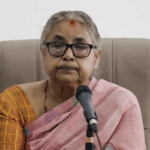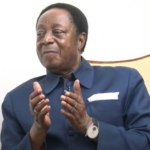
Nepal’s newly-appointed interim prime minister says she will be in the post for no longer than six months.
“I did not wish for this job. It was after voices from the streets that I was compelled to accept,” Sushila Karki said, speaking for the first time since being sworn into office on Friday. She said she would hand over to the new government which will emerge after elections on 5 March next year.
Her appointment comes after more than 70 people were killed during anti-corruption protests which ousted the Nepal’s government.
Karki took the oath of office after an agreement with protest leaders from the so-called “Gen Z” movement.
“We have to work according to the thinking of the Gen Z generation,” she said.
“What this group is demanding is the end of corruption, good governance and economic equality.”
The mass protests, sparked by a ban on social media platforms, started on 8 September and over the course of two days descended into chaos and violence during which politicians’ homes were vandalised and parliament was set on fire.
The death toll from the unrest has now reached 72, including three police personnel, officials say.
“I feel ashamed. If they were Nepalis who destroyed these essential structures, how can they be called Nepalis,” the interim prime minister said on Sunday.
Karki, a former Supreme Court chief justice, is widely regarded as having a clean image.
But she has not been free from controversy, having faced an impeachment incident during her nearly 11-month tenure as chief justice.
Now Karki and her cabinet will face multiple challenges, including restoring law and order, rebuilding parliament and the other key buildings that were attacked, in addition to reassuring the Gen Z protesters who want change – and others in Nepal who are fearful its young democracy and constitutional order may be derailed.



